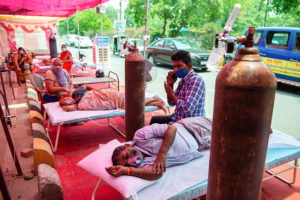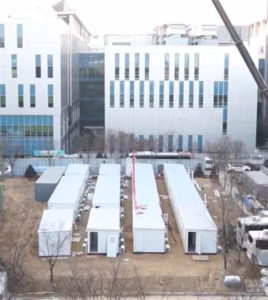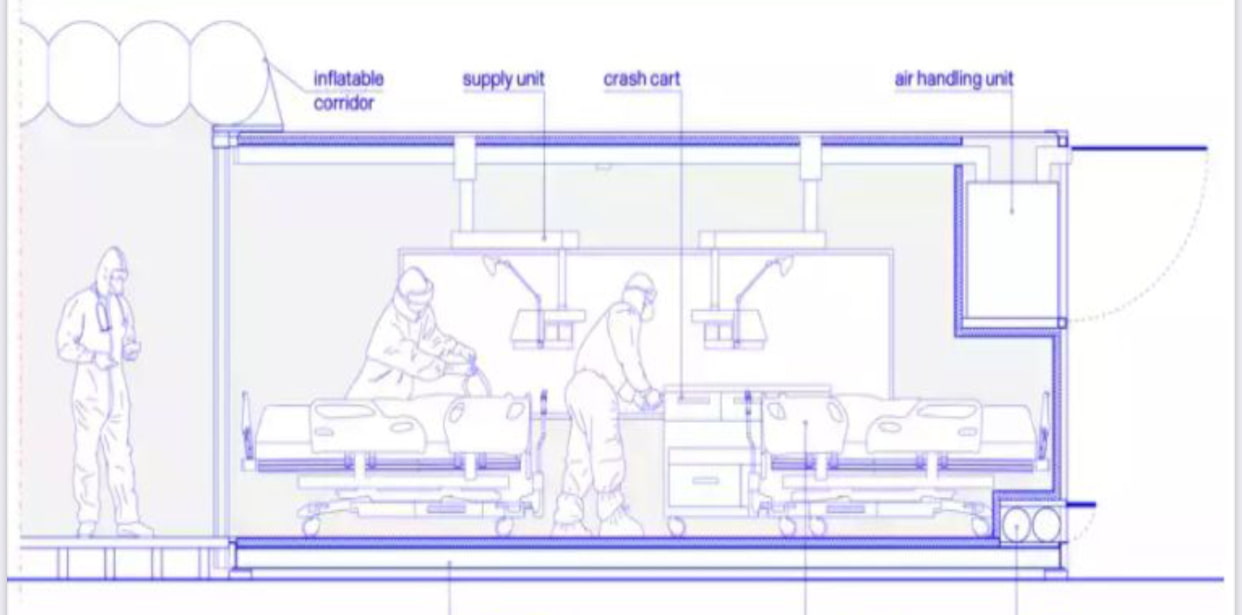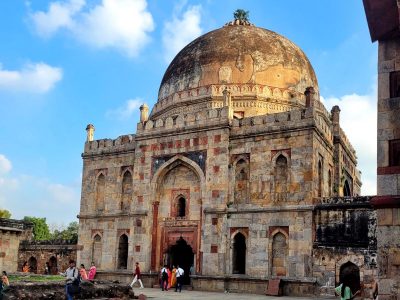An Indian entrepreneur, Ranjit Grewal, with the help of a Singaporean crypto pioneer, is retrofitting shipping containers into well-equipped hospitals—has great potential to revamp public health infrastructure
Lately, the Modi government has faced criticism from around the world for mismanaging the second wave of Covid-19 that left people scrambling for medical care, leading to the death of some 3 lakh individuals—with the qualification that it’s the official figure. Scores of bodies found floating down the Ganges, or buried in the sand graves also become a sore point for the government.
One of the offshoots of the crumbling of public health infrastructure in the face of the ranging pandemic is that many private players and members of the society, under their own steam, have tried to deal with the crisis by helping fellow citizens in the true sense of camaraderie and compassion.
Many resident welfare associations (RWAs) in the NCR have started their own little hospitals in the community center providing oxygen beds to the residents; the ‘oxygen langar’ in various Gurudwaras across the capital, and the drive-thru at parking lots in Noida saved many lives by—literally—breathing life into hundreds of dying patients. There are many such examples. While it’s heartening, it also points to the dismal state of India’s public health sector, while many private players were accused of profiteering from the crisis. In many instances they were also not ready to deal with this crisis of this proportion.

In light of this development, and as a step to refurbish the public health system in quick time, not just in the capital but in the vast dusty hinterland of the country, a novel initiative offers great prospects.
Ranjit Grewal, a Delhi-based entrepreneur whose business interests are global, has initiated a project where a metal shipping container—used for transportation—can be retrofitted in quick time into a well-equipped hospital.
Giving details of his most recent project Ranjit—one of the promoters of TechNestt Infrastructures—informs, “I’m manufacturing and refabricating shipping containers into medical infrastructure with beds, nursing stations and doctors’ offices for Covid-19 patients who have nowhere to go.”
The thing of importance is, as he puts it, “TechNestt doesn’t need money from anybody, we are building these at our own expense, all we need is a contract/authorisation from the respective hospital we park this make-shift structure to and the hospitals integrated billing system can simply pay us a fixed daily rate per bed in order for us to replenish our investment.”
Further, he informs, “We can provide enough space for 30-300 beds within days/weeks with proper compartmentalized HVAC systems, insulation walls, exterior cladding, and ramps for wheelchairs and office spaces for medical staff.”

The first of its kind facility with 200 oxygen beds has come up in sector 6 of Rohini, where a 6.1-meter-long shipping container houses ‘intensive care pods’ containing beds, with facilities like ventilators, monitors, intravenous fluid stands and syringe drivers – for two patients. “It has the benefits of quickly assembled hospital tents with the safety of a permanent isolation wards with ventilation systems that generate negative pressure” informs Ranjit highlighting its inherent advantage: that of mobility—it can be transported to areas worst affected by the pandemic, even in the rural settings. Or simply: it’s a well-equipped mobile hospital.
The funding is done by TechNestt Infrastructures, apart from Ranjit, promoted by CR Ravichandran. “Ravi is the investor, generating resources for the business, while I deal with the executive issues,” Ranjit informs. This project of theirs has the blessings of Peter Yeo, a billionaire from Singapore, founder of encrypto.sg, Nftbounty.comore and cloudminiing SG.
Talking about the situation in India some images have stayed in Peter’s mind like that of “people out on the street for oxygen…” He’s a doer. There’s no point in lamenting over a situation unless one has a solution or two to offer. Peter feels the solution lies in “quick to deploy container hospitals equipped with critical life support medical equipment.” And goes on to make a detailed presentation of his initiative—mobile hospital—emergency relief shelters—which is implemented in India with the collaboration of TechNestt Infrastructures.

Singapore vehemently opposed Delhi Chief Minister Arvind Kejriwal’s tweet regarding a “very dangerous” strain of the novel coronavirus was prevalent in the city-state of Singapore by saying there’s “no truth whatsoever in such assertions.” It has to be said that Singapore has been forthright in sending their help to deal with the pandemic. Individuals and organisations—like Singapore Red Cross (SRC)—alike have joined hands in large numbers to help India battle the pandemic surge by procuring and supplying medical supplies such as oxygen concentrators. SRC alone has gathered more than $2.6 million since it started its fund-raising drive on April 28. Peter is one such significant individual who’s actively trying to help as the situation in India has had an impact elsewhere in the world, and Peter wants to do his best to alleviate the situation.
The idea of the mobile hospitals has the potential to bridge the gap between the demand and supply—not just during the pandemic, but it can play a significant role in revamping and strengthening the primary health infrastructure across the length and breadth of this vast and varied country. The only long term benefit of the crisis could be if we are able to revamp our health infrastructure.





